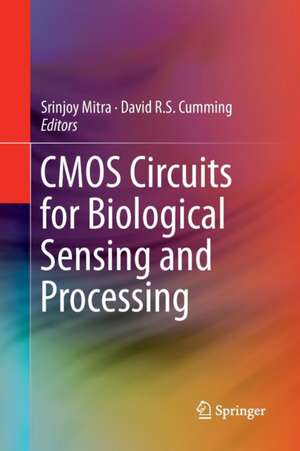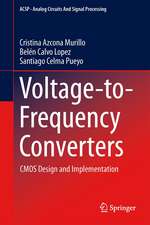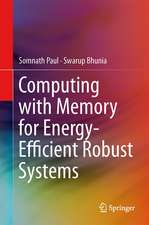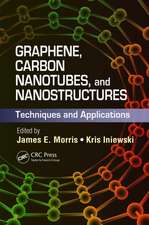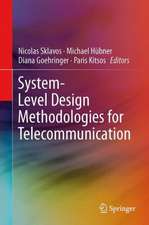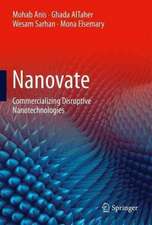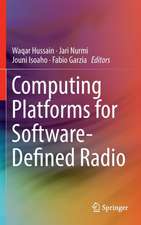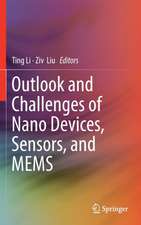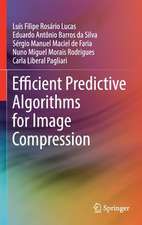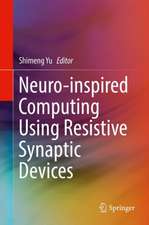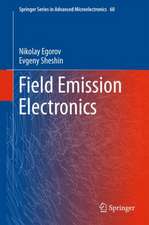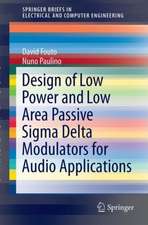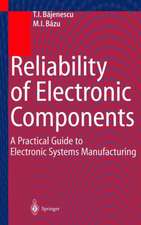CMOS Circuits for Biological Sensing and Processing
Editat de Srinjoy Mitra, David R. S. Cummingen Limba Engleză Paperback – 27 mai 2018
| Toate formatele și edițiile | Preț | Express |
|---|---|---|
| Paperback (1) | 699.93 lei 43-57 zile | |
| Springer International Publishing – 27 mai 2018 | 699.93 lei 43-57 zile | |
| Hardback (1) | 953.65 lei 43-57 zile | |
| Springer International Publishing – 29 noi 2017 | 953.65 lei 43-57 zile |
Preț: 699.93 lei
Preț vechi: 823.44 lei
-15% Nou
Puncte Express: 1050
Preț estimativ în valută:
133.93€ • 140.21$ • 110.82£
133.93€ • 140.21$ • 110.82£
Carte tipărită la comandă
Livrare economică 07-21 aprilie
Preluare comenzi: 021 569.72.76
Specificații
ISBN-13: 9783319884752
ISBN-10: 3319884751
Ilustrații: VIII, 349 p. 215 illus., 176 illus. in color.
Dimensiuni: 155 x 235 mm
Greutate: 0.5 kg
Ediția:Softcover reprint of the original 1st ed. 2018
Editura: Springer International Publishing
Colecția Springer
Locul publicării:Cham, Switzerland
ISBN-10: 3319884751
Ilustrații: VIII, 349 p. 215 illus., 176 illus. in color.
Dimensiuni: 155 x 235 mm
Greutate: 0.5 kg
Ediția:Softcover reprint of the original 1st ed. 2018
Editura: Springer International Publishing
Colecția Springer
Locul publicării:Cham, Switzerland
Cuprins
CMOS nano-pore technology.- Metabolomics on CMOS Personalised Medicine.- Flexible Single-Photon Image Sensors.- Photonic interaction with the nervous system.- Microelectronics for muscle fatigue monitoring through surface EMG.- IC Design for high-density Neural probe.- Implantable Microsystems for Personalised Anti-Cancer Therapy.- Compressed Sensing for Neural Recording compression and analysis.- Design optimization for wearable EEG sensors.- CMOS multimodal sensor array for biomedical sensing.- Micro-NMR on CMOS for biomolecular sensing.- Circuits and Systems for Biosensing with Microultrasound.- Very Large scale neuromorphic systems for biological signal processing.- Index.
Notă biografică
Srinjoy Mitra is a lecturer at the University of Glasgow. He received his Ph.D. from the Institute of Neuroinformatics, ETH, Zurich in 2004. Until early 2016, he was part of the medical electronics division at IMEC, Belgium, and led multiple projects on wearable and implantable electronics. His primary research interest is in designing novel mixed-signal CMOS circuits for advancement in medical and neural electronics.
David Cumming, FRSE, FREng, FIEEE, is the Head of the School of Engineering at the University of Glasgow. He holds a PhD in microelectronics from the University of Cambridge and leads the Microsystem Technology Group in Glasgow where he has pioneered a range of CMOS based sensor technologies including chemical sensing arrays using ion sensitive field effect transistors and the integration of nanophotonic technologies for imaging applications.
David Cumming, FRSE, FREng, FIEEE, is the Head of the School of Engineering at the University of Glasgow. He holds a PhD in microelectronics from the University of Cambridge and leads the Microsystem Technology Group in Glasgow where he has pioneered a range of CMOS based sensor technologies including chemical sensing arrays using ion sensitive field effect transistors and the integration of nanophotonic technologies for imaging applications.
Textul de pe ultima copertă
This book provides the most comprehensive and consistent survey of the field of IC design for Biological Sensing and Processing. The authors describe a multitude of applications that require custom CMOS IC design and highlight the techniques in analog and mixed-signal circuit design that potentially can cross boundaries and benefit the very wide community of bio-medical engineers.
- Provides a single-source reference to the state-of-the-art in analog and mixed-signal circuit design for biological and chemical sensing;
- Highlights numerous applications, categorized as Ex-vivo, In-vivo, and Wearable and Technology Trends;
- Explains basic details of the circuits used in a very consistent manner, identifying clearly the CMOS and non-CMOS technologies used, along with the method to interact with the transducer (various kinds of electrodes, ion-sensitive layers, Carbon nanotubes etc.)
Caracteristici
Provides a single-source reference to the state-of-the-art in analog and mixed-signal circuit design for biological and chemical sensing Highlights numerous applications, categorized as Ex-vivo, In-vivo, and Wearable and Technology Trends Explains basic details of the circuits used in a very consistent manner, identifying clearly the CMOS and non-CMOS technologies used, along with the method to interact with the transducer (various kinds of electrodes, ion-sensitive layers, Carbon nanotubes etc.)
